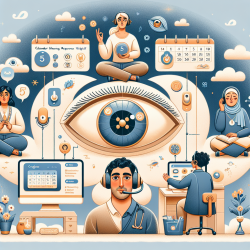In the dynamic world of education, school social workers play a pivotal role in supporting students' emotional, social, and academic growth. As our educational environments evolve, so do the challenges and opportunities to meet the diverse needs of our students. One significant advancement that has been gaining traction is the integration of online therapy services into the school's support system. This detailed exploration aims to spark curiosity among school social workers about the potential of online therapy services to foster a stronger community within our schools.
At the heart of any school community is the commitment to provide all students with the support they need to succeed. This includes addressing the increasing demand for speech therapy and other therapeutic services. Traditional in-person therapy, while effective, often faces hurdles such as staffing shortages and limited resources, making it challenging to meet every student's needs. This is where the power of online therapy services, such as those offered by TinyEYE, becomes evident.
Embracing a Community Approach with Online Therapy Services
- Accessibility: Online therapy services break down geographical and logistical barriers, making it easier for students in remote or underserved areas to receive the support they need. This inclusivity strengthens the school's sense of community by ensuring no student is left behind due to location or resource constraints.
- Flexibility: The nature of online therapy allows for greater flexibility in scheduling, making it more convenient for students, families, and therapists. This adaptability helps to create a more supportive and responsive community environment within the school.
- Diverse Expertise: Online therapy platforms provide access to a wide range of specialists, including those in speech therapy staffing. This diversity in expertise enables schools to offer more personalized and effective support to students, fostering a stronger, more inclusive community.
- Engagement: Many students are digital natives, comfortable and engaged with technology. Online therapy services leverage this by using interactive tools and resources, making therapy sessions more engaging and effective for students. This engagement helps to build a more connected and supportive school community.
Creating a Supportive Network for School Social Workers
For school social workers, integrating online therapy services into the school's support system is not just about leveraging technology; it's about building a stronger, more connected community. Online therapy services offer social workers a platform to collaborate with therapists, teachers, and families, creating a comprehensive support network around each student. This collaborative approach enhances the school's community by ensuring that all stakeholders are informed, involved, and invested in the success of each student.
Moreover, online therapy services like TinyEYE offer ongoing training and resources, helping school social workers stay informed about the latest in therapy and support strategies. This commitment to professional development is essential for fostering a knowledgeable and responsive community that can adapt to the changing needs of its students.
Conclusion
As school social workers explore the potential of online therapy services, it's important to approach this innovation with curiosity and an open mind. The integration of these services into our schools offers a promising path forward to address staffing shortages, enhance accessibility, and ultimately strengthen the community within our schools. By embracing online therapy, school social workers can play a pivotal role in creating a more inclusive, supportive, and engaged educational environment for all students.
Let's continue to explore and embrace innovative solutions that bring our school communities closer together, ensuring every student has the support they need to thrive.










